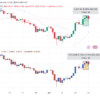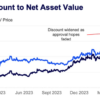
Crypto Trading Mistakes to Avoid in 2023
In this article, we’re diving into the world of crypto trading in 2023, uncovering the essential mistakes to dodge for a prosperous trading expedition. From steering clear of revenge trading to harnessing the power of risk-reward ratios, these insights will serve as your compass for crafting savvy decisions and safeguarding your investments in the challenging crypto realm.
Crypto trading, a labyrinthine endeavor. Mistakes here, especially for newcomers, can be disheartening, even prompting thoughts of throwing in the towel. It’s a realm where fortunes are won and lost in the blink of an eye.
The secret to crypto trading triumph? Treat it as a mathematical equation while nurturing the right mindset. Those who tread this path with calculation tend to amass wealth, while those who don’t are left counting their losses.
To shield your finances in crypto trading, create a systematic approach and learn from your mishaps. Within this guide, we unveil the common pitfalls that often steer crypto traders towards the exit door. These nuggets of wisdom are crucial, and by integrating them, you can curtail your 2023 losses.
Table of Contents
The Mistakes to Avoid
Skipping Paper Trading
- Before diving into real trades, engage in paper trading to hone your skills.
- Experiment with diverse strategies and grasp market dynamics.
- Build the confidence necessary for informed real-money investments.
Neglecting Percentage-Based Tracking
- Assess your wins and losses as percentages of your total investment.
- Gain a more comprehensive view of your trading performance.
- Enhance decision-making by understanding your strategies’ effectiveness.
Disregarding Stop Losses
- Implement stop losses to minimize losses when trades go awry.
- Utilize the risk management tool offered by leading crypto exchanges.
Proceeding Without a Trading Plan
- Create a trading plan with clear parameters, including entry/exit points and risk tolerance.
- Avoid holding onto losing positions for too long by following your plan diligently.
Avoid Herd Mentality
- Develop your unique trading style that aligns with your goals and resources.
- Embrace individuality rather than mimicking others’ strategies.
Jumping Into Margin Trading Too Early
- Refrain from margin trading until you’ve mastered the basics and gained confidence.
- Minimize risks associated with borrowed funds to protect your portfolio.
Overlooking Fundamental Analysis
- Prioritize fundamental analysis to understand a cryptocurrency’s purpose, potential, and team.
- Avoid cryptocurrencies that appear strong on technical analysis but lack solid fundamentals.
Falling into the Revenge Trade Trap
- Resist the urge to revenge trade after a loss; it can lead to riskier decisions.
- Focus on a well-structured risk-reward strategy to maintain a positive trajectory.
Disregarding Risk/Reward Ratio
- Always target trades where potential gains outweigh potential losses.
- Stick to a well-defined risk-reward strategy to protect your portfolio in both wins and losses.
Neglecting Journaling
- Maintain a trading journal to document your trades and post-trade analyses.
- Use this tool to refine your strategies progressively and gain critical insights.
Final Thoughts
In conclusion, the crypto trading journey is laden with valuable lessons. These ten common missteps underscore the need for a disciplined and strategic approach. From sidestepping impulsive revenge trading to embracing the principles of risk-reward ratios, each blunder serves as a stepping stone toward growth and improvement. Successful crypto trading is an ongoing process of learning and evolution. Embrace these mistakes, work on them, and you’ll soon witness a positive shift in your profits.
A cryptocurrency exchange is an online platform where you can buy, sell, or trade cryptocurrencies like Bitcoin, Ethereum, and others.
Safety varies by exchange. Look for platforms with strong security measures, like two-factor authentication and cold storage for funds.
Consider factors like security, fees, available coins, user interface, and customer support.
Centralized exchanges are managed by a company, while decentralized exchanges operate without a central authority.
Many exchanges require Know Your Customer (KYC) verification for security and regulatory compliance.
Trading fees vary but typically include maker fees (for adding liquidity) and taker fees (for removing liquidity).
Yes, most exchanges offer cryptocurrency-to-cryptocurrency trading pairs.
Withdrawal times depend on the exchange and the cryptocurrency. Some are instant, while others may take hours or even days.
A wallet address is like a bank account number for cryptocurrencies. It’s required to send your crypto to the right place.
Yes, depending on your country’s tax laws, trading cryptocurrencies may have tax consequences. Consult a tax professional for guidance.
Yes, many cryptocurrency exchanges operate 24/7, allowing you to trade at any time.
A market order buys or sells at the current market price, while a limit order sets a specific price at which you want to buy or sell.
Yes, each exchange sets its own minimum and maximum trading limits, which can vary widely.
It’s not recommended. For security, it’s better to use a cryptocurrency wallet, especially for significant holdings.
Exchanges typically have account recovery processes, including password reset options and support for forgotten usernames.
Some exchanges offer insurance, but coverage can be limited. It’s essential to check an exchange’s insurance policy.
Use strong passwords, enable two-factor authentication, and be cautious of phishing scams and suspicious emails.
Yes, but it’s recommended to learn the basics of trading and understand the risks involved before you start.
Stablecoins are cryptocurrencies pegged to the value of a fiat currency like the US dollar. They provide stability and are commonly used for trading and transferring funds on exchanges.
Yes, regulations vary by country. Many countries have implemented or are considering regulations to govern cryptocurrency exchanges for consumer protection and financial stability.























